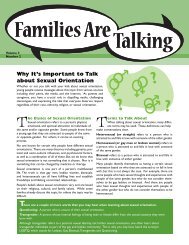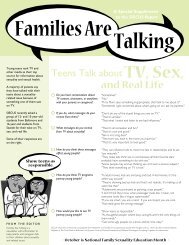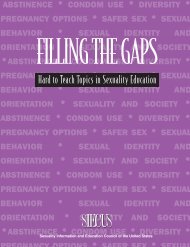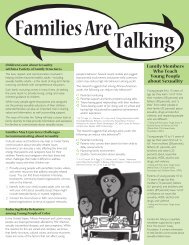What Is Normal Childhood Sexual Development? - Sex Ed Solutions
What Is Normal Childhood Sexual Development? - Sex Ed Solutions
What Is Normal Childhood Sexual Development? - Sex Ed Solutions
- No tags were found...
You also want an ePaper? Increase the reach of your titles
YUMPU automatically turns print PDFs into web optimized ePapers that Google loves.
FAMILIES ARE TALKINGVolume 3, Number 42004Amy Levine, M.A.Family Project CoordinatorMonica RodriguezVice President for<strong>Ed</strong>ucation and TrainingMartha Kempner, M.A.Director of Public InformationJoseph DiNorcia, Jr.President and CEOAnna RaffDesign and LayoutFamilies Are Talking is a quarterlynewsletter published by the<strong><strong>Sex</strong>ual</strong>ity Information and<strong>Ed</strong>ucation Council of the UnitedStates (SIECUS), a nationalnonprofit organization foundedin 1964. SIECUS affirms thatsexuality is a fundamental part ofbeing human, one that is worthyof dignity and respect.Weadvocate for the right of allpeople to accurate information,comprehensive education aboutsexuality, and sexual healthservices. SIECUS works to createa world that ensures socialjustice and sexual rights. To findout more information aboutSIECUS, visit www.siecus.org.SIECUSFamily Project130 West 42nd Street, Suite 350New York, NY 10036-7802Phone: 212/819-9770Fax: 212/819-9776Policy Office1706 R Street, N.W.Washington, DC 20009Phone: 202/265-2405Fax: 202/462-2340We invite you to visitwww.familiesaretalking.orgfor more information andpublications. For informationand publications in Spanish,including the Spanish translationof this newsletter,La familia habla, visitwww.lafamiliahabla.orgJoin our listserv to receivefuture Families Are Talkingnewsletters and information.E-mail families_are_talkingsubscribe@topica.comtosubscribe.You must e-mail fromthe address you want toreceive the information.This newsletter is supportedby a grant fromThe Annie E. Casey Foundation.ASKAMYDo I need to tell the other parent that our kids were playing doctor?QThe other day, my 4-year-old daughter’s friend came home with her after school for a play-date.When I checked on them, I found them playing doctor. Do I need to tell the friend’s parent?AYes, it’s important to mention what you observed. Parents appreciate knowing what goes on withtheir children when they are not around—whether it’s that the play-date went splendidly, that thechild was given a snack after school, or that she/he fell and scraped her knee when playing outside.And, while it may not be as easy to bring up, you should also share the sexuality-related scenario andhow you handled it.If after finding out, the other parent doesn’t agree with what you did and said, don’t take it personally.The reality is that child-rearing styles vary. Nonetheless, most parents will be glad that you brought itto their attention, giving them the opportunity to share messages and values with their child.How do I handle my pre-teen viewing porn on the Internet?QMy 12-year-old son is always using the Internet. He says that he is doing homework.After checkinghis computer without his knowledge, it seems that he has been viewing adult websites, possiblyfor hours on end. How can I bring up the topic without letting him know that I “spied” on him?AWhile it’s possible that your son is deliberately looking at adult websites, it could also be thatsomeone else has used his computer or that the sites appear spontaneously as pop-up ads.<strong>What</strong>ever the case may be, the truth of the matter is that today’s youth are bombarded by sexyimages of scantily clad bodies on the Internet, billboards, television, and in magazines. Not to mention,if he hasn’t already, within the next few years, your son will be going through puberty.Whether or nothe’s looking at porn sites, he’s likely curious about how his body will look and may wonder what thefemale form looks like nude.In the meantime, if you are concerned about his computer usage, set ground rules.Try limiting hiscomputer time; moving the computer to a space where you can observe his viewing habits (youcan explain this by telling him that everyone in your family wants easy computer access); and mostimportantly, give him sites where he can find credible, age-appropriate sexuality information likewww.teenwire.com and www.scarleteen.com.As a parent, you are the primary sexuality educator of your child. So, if you haven’t already, think aboutthe messages you want to share.Then, open the dialogue and keep it open, addressing various topics asteachable moments occur. For example, use a magazine like Maxim (which is definitely for young men,but easily accessible to young boys) to illustrate that many of the models in the magazine are airbrushedto look “perfect” rather than realistic. And, let him know that many companies use sex to sell sneakers,computers, and other popular items by positioning models in very sexy poses. Flipping through themagazine, you’ll likely find a few photos to illustrate your point.As you discuss each concept, ask your sonwhat he thinks.While it may not happen overnight, hopefully over time, a full-fledgedconversation will transpire.Amy Levine, M.A., is SIECUS’ Family Project Coordinator and has worked at SIECUS for over 9years. She is certified as a sexuality educator by the American Association of <strong>Sex</strong> <strong>Ed</strong>ucators,Counselors, and Therapists. Send your questions to Amy at alevine@siecus.org or mail them toher at SIECUS, Family Project, 130 West 42nd Street, Suite 350, New York, NY 10036.Check out new Q & As at www.familiesaretalking.org/ask_amy/index.html
















